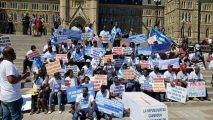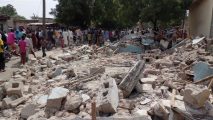Categories
Recent Posts
- Yaoundé: Defense Ministry says “Clear Alliance” between Boko Haram and criminals in recent attack
- Football: MTN Elite One resumes after boycott threats
- Biya’s election season stirs renewed anxiety in Southern Cameroons
- Revealed: Boko Haram fighters kill 20 Cameroonian troops
- Niger: military leader Tiani sworn in as president for five-year transition period
Archives
- March 2025
- February 2025
- January 2025
- December 2024
- November 2024
- October 2024
- September 2024
- August 2024
- July 2024
- June 2024
- May 2024
- April 2024
- March 2024
- February 2024
- January 2024
- December 2023
- November 2023
- October 2023
- September 2023
- August 2023
- July 2023
- June 2023
- May 2023
- April 2023
- March 2023
- February 2023
- January 2023
- December 2022
- November 2022
- October 2022
- September 2022
- August 2022
- July 2022
- June 2022
- May 2022
- April 2022
- March 2022
- February 2022
- January 2022
- December 2021
- November 2021
- October 2021
- September 2021
- August 2021
- July 2021
- June 2021
- May 2021
- April 2021
- March 2021
- February 2021
- January 2021
- December 2020
- November 2020
- October 2020
- September 2020
- August 2020
- July 2020
- June 2020
- May 2020
- April 2020
- March 2020
- February 2020
- January 2020
- December 2019
- November 2019
- October 2019
- September 2019
- August 2019
- July 2019
- June 2019
- May 2019
- April 2019
- March 2019
- February 2019
- January 2019
- December 2018
- November 2018
- October 2018
- September 2018
- August 2018
- July 2018
- June 2018
- May 2018
- April 2018
- March 2018
- February 2018
- January 2018
- December 2017
- November 2017
- October 2017
- September 2017
- August 2017
- July 2017
- June 2017
- May 2017
- April 2017
- March 2017
- February 2017
- January 2017
- December 2016
- November 2016
- October 2016
- September 2016
- August 2016
- July 2016
- June 2016
Featured
Most Commented Posts
 4 Anglophone detainees killed in Yaounde
4 Anglophone detainees killed in Yaounde
18 comments Chantal Biya says she will return to Cameroon if General Ivo Yenwo, Martin Belinga Eboutou and Ferdinand Ngoh Ngoh are sacked
Chantal Biya says she will return to Cameroon if General Ivo Yenwo, Martin Belinga Eboutou and Ferdinand Ngoh Ngoh are sacked
13 comments The Anglophone Problem – When Facts don’t Lie
The Anglophone Problem – When Facts don’t Lie
12 comments Anglophone Nationalism: Barrister Eyambe says “hidden plans are at work”
Anglophone Nationalism: Barrister Eyambe says “hidden plans are at work”
12 comments Largest wave of arrest by BIR in Bamenda
Largest wave of arrest by BIR in Bamenda
10 comments
Latest Tweets
Featured
-

Yaoundé: Defense Ministry says “Clear Alliance” between Boko Haram and criminals in recent attack
-

Football: MTN Elite One resumes after boycott threats
-

Biya’s election season stirs renewed anxiety in Southern Cameroons
-

Revealed: Boko Haram fighters kill 20 Cameroonian troops
-

Niger: military leader Tiani sworn in as president for five-year transition period
-

Over 10 Cameroon gov’t soldiers killed, 20 injured in Boko Haram attack
-

1982-2025: How long will Biya hang on?
© Cameroon Concord News 2025





31, May 2018
Zimbabwe: Mixed reactions greet July 30 polls 0
Mixed reactions have greeted news of a July 30 date for Zimbabweans first general elections after Robert Mugabe was forced out of power.
On Wednesday, Emmerson Mnangagwa announced that a general election will be held on July 30, seen as crucial to securing foreign investments.
“I think he has got the final say, he has got the powers to put on a date, we have been ready to vote”, said Harare resident, Aston Matava.
Frank Nemayire ’‘looks forward to any changes in employment, or lack of liquidity, from the one who will be elected.“
However some are disgruntled. The opposition Movement for Democratic Change (MDC), which relies on voters who have fled the Mugabe regime, has suffered a setback as the Constitutional Court has decided that Zimbabweans in the diaspora could only vote by moving to the country.
‘‘First of all we have been clamoring for diaspora vote, we wanted the demilitarization of Zimbabwe’s Electoral Commission and the army, the state security agents should not be involved in the electoral process”, said Albert Chidhakwa.
Lyne tte Biti thinks the announcement is rather too soon. ‘‘In my opinion our party’s demands for electoral reforms have not been heard, so it makes no sense”, she added.
Missing from July’s election, for the first time in 20 years, will be Zimbabwe’s foremost political gladiators, Mugabe and longtime leader of the MDC, Morgan Tsvangirai, who died of cancer in February.
Mnangagwa goes into the election with the advantages of incumbency and the backing of the army. His face main rival is 40-year-old Nelson Chamisa and the MDC.
Critics have accused Mnangagwa of being Mugabe’s most loyal acolyte, and blame him for a crackdown on rebels in the mid-1980s that rights groups say killed 20,000 civilians. He denies those charges.
Source: Reuters